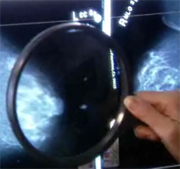
THURSDAY, April 22 (HealthDay News) — A new review suggests that doctors need to address the problem of overdiagnosis in cancer care — the detection and possible treatment of tumors that may never cause symptoms or lead to death.
The review authors found that about 25 percent of breast cancers found through mammograms and about 60 percent of prostate cancers detected through prostate-specific antigen (PSA) tests may be examples of overdiagnosis. And about half of lung cancers detected through some screening tests may also represent overdiagnosis, they added.
For several types of cancer — thyroid, prostate, breast, kidney and melanoma — the number of new cases has gone up over the past 30 years, but the death rate has not, the authors noted. Research suggests that more screening tests are responsible for the increased diagnosis rate, they explained.
“Whereas early detection may well help some, it undoubtedly hurts others,” Dr. H. Gilbert Welch and Dr. William Black, of the VA Medical Center in White River Junction, Vt., and the Dartmouth-Hitchcock Medical Center, wrote in a news release from the U.S. National Cancer Institute. “Often the decision about whether or not to pursue early cancer detection involves a delicate balance between benefits and harms . . . different individuals, even in the same situation, might reasonably make different choices.”
In a commentary, Dr. Laura Esserman, of the University of California at San Francisco, and Dr. Ian Thompson, of the University of Texas Health Science Center at San Antonio, wrote: “What we need now in the field of cancer is the coming together of physicians and scientists of all disciplines to reduce the burden of cancer death and cancer diagnosis. We must advocate for and demand innovation in diagnosis and management, fueled by science, harnessing modeling, molecular and immunology tools to address this problem.”
The review is published in the April 22 online edition of the Journal of the National Cancer Institute.
More information
The U.S. National Library of Medicine has more on cancer.

